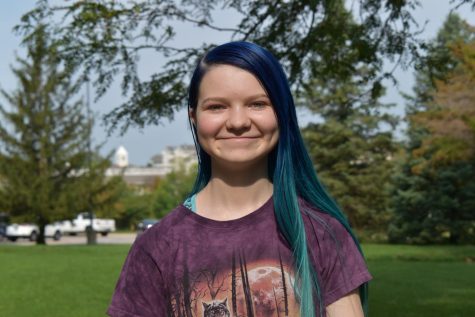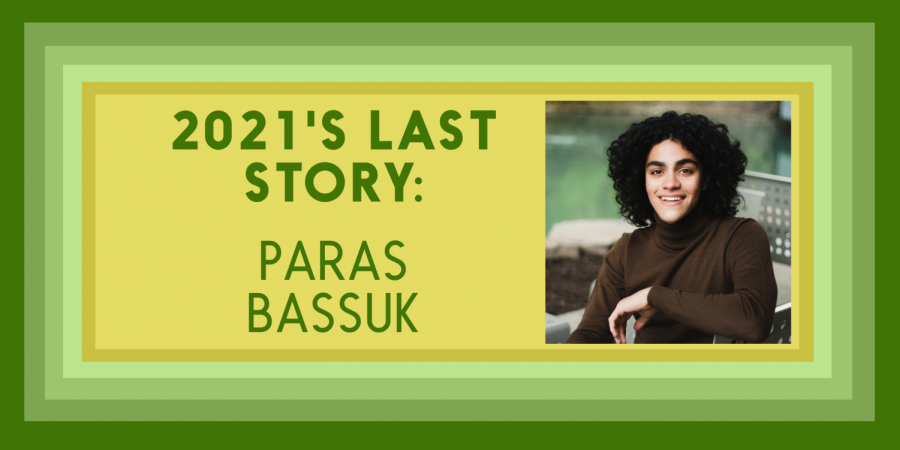2021’s Last Story: Paras Bassuk ’21
Paras Bassuk ’21 is a student fighting for justice and making a difference through state legislation.
Photo courtesy of Paras Bassuk
Paras Bassuk ’21 advocates for students to have a say in Iowa government.
This interview does not reflect the will of the State of Iowa Youth Advisory Council or the Iowa Department of Human Rights.
For a lot of students, legislation, bills and senate files are just vocabulary terms they learned from a textbook. Proposing a bill or being involved in state legislation is something that they would never even consider. Paras Bassuk ’21 wants to change this mindset.
Bassuk’s work with the Iowa legislature started in the fall of 2020 when they became the Education Committee Chair of the State of Iowa Youth Advisory Council (SIYAC). SIYAC was created by the Iowa Department of Human Rights as a way for Iowa youth to have a say in the legislation about topics that concern them. Bassuk joined SIYAC after hearing about it from a former West student.
“[SIYAC] piqued my interest because of its association with the Iowa Department of Human Rights and its hands-on advocacy opportunities,” Bassuk said.
There are 21 members on SIYAC, from all over the state, and each term lasts for two years. One of the first things that SIYAC focused on when Bassuk started their term was changing the legislation on teaching licensure requirements to include more cultural responsiveness and equity inclusion training. To accomplish this, SIYAC wrote a bill known as Senate File 248.
“The idea with culturally responsive education is that it lifts everyone up to be able to succeed,” Bassuk said. “And we have some pretty glaring disproportionalities in Iowa’s education system. Juvenile incarceration rates and achievement growth rates by race are really disparate. You see black and brown students performing and being supported much less than white students. … So the goal with this legislation was to sort of make it a statewide expectation that teachers were trained in cultural responsiveness to try to fight these disproportionalities.”
Bassuk helped write a position statement about these inequalities that made culturally responsive education become one of SIYAC’s top legislative priorities for the school year. As the chair of the education committee, Bassuk and the committee focused on advocating for a bill to be written and forwarded their position statement to legislators to see if they were interested in adapting it into a bill.
The members of SIYAC based the bill on some previous legislation that had been introduced along with research that they conducted on disproportionalities in the education system. They used this research to create the first part of the bill, a rationale that explained why the bill was necessary. From there, they wrote up a recommendation of action on what the Senate should do with this information.
Writing something like this was a new experience for Bassuk, so they reached out to the ICCSD Equity Advisory Committee that they are a part of for guidance. The Equity Committee is a group of community members and students that advise the district on ways to make the district fairer for all students.
“We were able to use the Equity Committee as a focus group almost for our bill as it was in the drafting process to see what a pretty representative array of educators and administrators and parents would feel about this bill,” Bassuk said.
Once the bill was written, Senator Joe Bolkcom introduced SF 248 to the Senate where it was assigned to a subcommittee. For a bill to become a law, a subcommittee goes over the bill and decides on whether or not the bill progresses.
“Those legislators never convened about that bill,” Bassuk said. “Which is a strategic political choice in some ways, but also the nature of the legislature. Not every bill gets a hearing with the subcommittee and not every bill progresses. Most bills take several introductions to actually pass into law. So hopefully we can keep working on this and try to make this change in the future.”
Bassuk’s first foray into legislation with their writing of the bill opened their eyes to the opportunities that they had in regards to Iowa legislature.
“That access sort of started a whole new level of interest for me. I didn’t realize that I could have a voice like that on that level,” Bassuk said. “You don’t have to be on-site to be able to write a book proposal or talk to legislators or advocate for things. I think in learning about the legislature and having this hands-on experience I was sort of like, ‘Wow, this is a really cool way to advocate.’”
In the past year, Bassuk has learned a great deal about how the government works. A lot of information they learned on the go, as a member of SIYAC, but they’ve also done a lot of their own research. Their biggest motivator to learn more was the realization that they could have an impact.
“It didn’t feel like I was learning about the government like I might in gov class, in a sort of academic way,” Bassuk said. “It felt more like I was learning about it with intention and with a goal, and that really was inspiring. I want this information, because you know we are the constituency in the state … I think it’s imperative that people have the access to information about how to advocate for their interests.”
One of the main ways that Bassuk is involved with the state legislature is through speaking at subcommittee meetings. The first time that Bassuk spoke at one of these meetings was to speak against the Voucher bill, or SF 159, which would take money away from public schools and pay for students to go to private schools.
“There are plenty of good private schools … [but they] are also exempt from a lot of regulation,” Bassuk explained. “So they have the ability to discriminate against students, legally, and they have the ability to censor what their teachers teach in a lot more ways than can happen in public school. That is contrary to the interest of our state, we need our students to be educated in a standardized and thorough way, so I spoke out against that bill.”
From there, Bassuk began to speak out about more bills. This year, there were 15 anti LGBTQ+ bills introduced in the House and Senate, a lot of them targeting LGBTQ+ youth specifically, so Bassuk attended subcommittee meetings about these bills.
“[The bills], at least for me, were part of what inspired me to be like, ‘Oh … I don’t even have to do any imagining to understand how the legislature is affecting me because it is affecting me. These bills affect queer youth,’” Bassuk said.
The second bill that Bassuk advocated against was House File 187, also known as the bathroom bill, that would prevent trans students from using the bathroom that corresponds with their gender identity.
“That one was more disturbing to me,” Bassuk said. “I felt a little more confident in speaking because I had already spoken at one, but my comments went, not only unheard, but there was retaliation [from people] with the opposing viewpoint. One of the senators stated that there have only been two genders ever in the history of the world, which is false. It’s a total misunderstanding of gender and a conflation of gender and sex … that’s based on pseudoscience and it was scary to hear that from our legislators.”
The bathroom bill continued on to the next stage of the process, where there is little to no community involvement. However, it was eventually stopped before it could become a law.
“We didn’t necessarily change legislators’ minds,” Bassuk said. “But I do feel like having a legislator look a student in the eye, or someone that will be directly impacted by the bill, makes them stop for a second. It makes them say, ‘There’s a 17-year-old at the Senate subcommittee, telling me that they oppose this legislation, what’s happening here is out of the norm.’”
Just like the bathroom bill, none of the 14 other anti LGBTQ+ bills were made into laws.
“Thankfully, all 15 of those anti-LGBTQ plus bills were stopped… so none of [them] are going to be hurting students in the future, which is really great. What’s scary is how many there were and how big the push was, and I am anticipating that those bills will be reintroduced in the future in future legislative sessions,” Bassuk said.
Bassuk was one of the only students advocating at this level, but they wanted more youth to be involved. To accomplish this goal, in February, Bassuk created the Iowa Youth Advocacy Network. Made up of about 40 people, IYAN hosts collaborative training sessions where the members get to learn from each other about resources and experiences with advocacy. They have a Discord server, emailing list and zoom meetings where they can discuss these topics. Due to the IYAN, many students have had the opportunity to attend subcommittee hearings and have their voices heard.
“Speaking in the legislature made me realize that I have more of a voice than I thought I did in state-level politics. And I realized that youth were totally not represented in any of these discussions like I was. There were never other students speaking at these events. I know that students have strong opinions and students want to be heard. They just don’t necessarily know how,” Bassuk explained.
Bassuk started with just a Discord server to accommodate for varying schedules, and eventually created a website that includes a bunch of resources for students.
“[The website is] kind of my baby, honestly. It’s everything that I have learned about legislative advocacy,” Bassuk said. “I feel like [that information] should be out there and available.”
Students can join IYAN by filling out the form linked on the IYAN website, so they can learn more about legislative advocacy.
In the coming year, Bassuk plans on continuing to work on IYAN, continuing the second year of his SIYAC term and staying on the Equity Advisory Committee as a community member. He’ll also be majoring in Ethics and Public Policy and Psychology at the University of Iowa.
“I’m looking forward to continuing to learn and spreading the word about legislative advocacy because I think it’s a really, really effective way to have your voice heard,” Bassuk said. “Students have so many great ideas and such good input and the people that are impacted by these bills should be the ones that are being vocal about it and that are being heard.”
Your donation will support the student journalists of West High School. Your contribution will allow us to purchase Scholarship Yearbooks, newsroom equipment and cover our annual website hosting costs.

(she/her) Bess Frerichs is the online managing and feature editor. As a senior, this is her third and final year on staff. She enjoys reading, writing...



